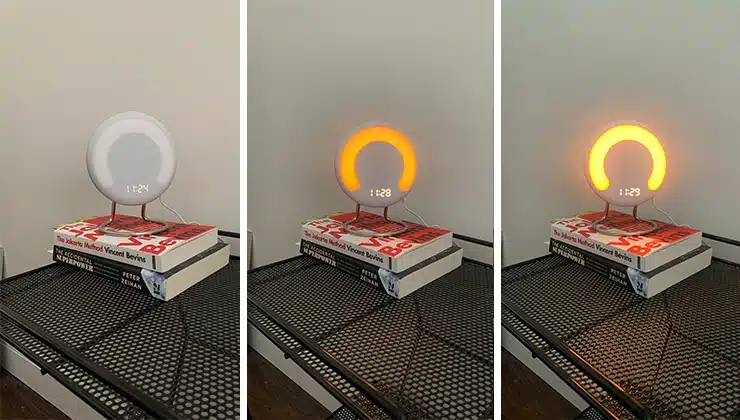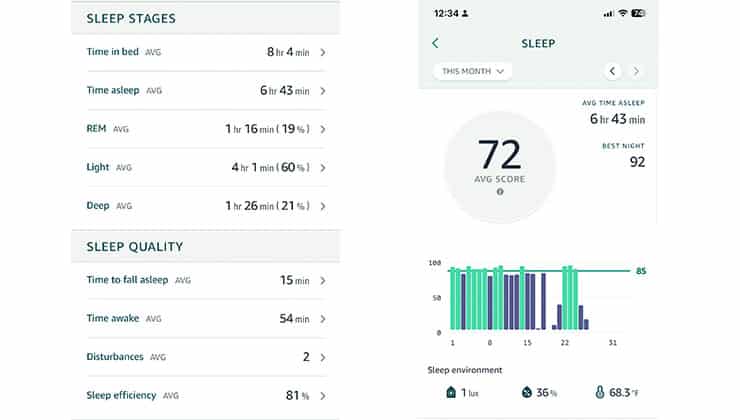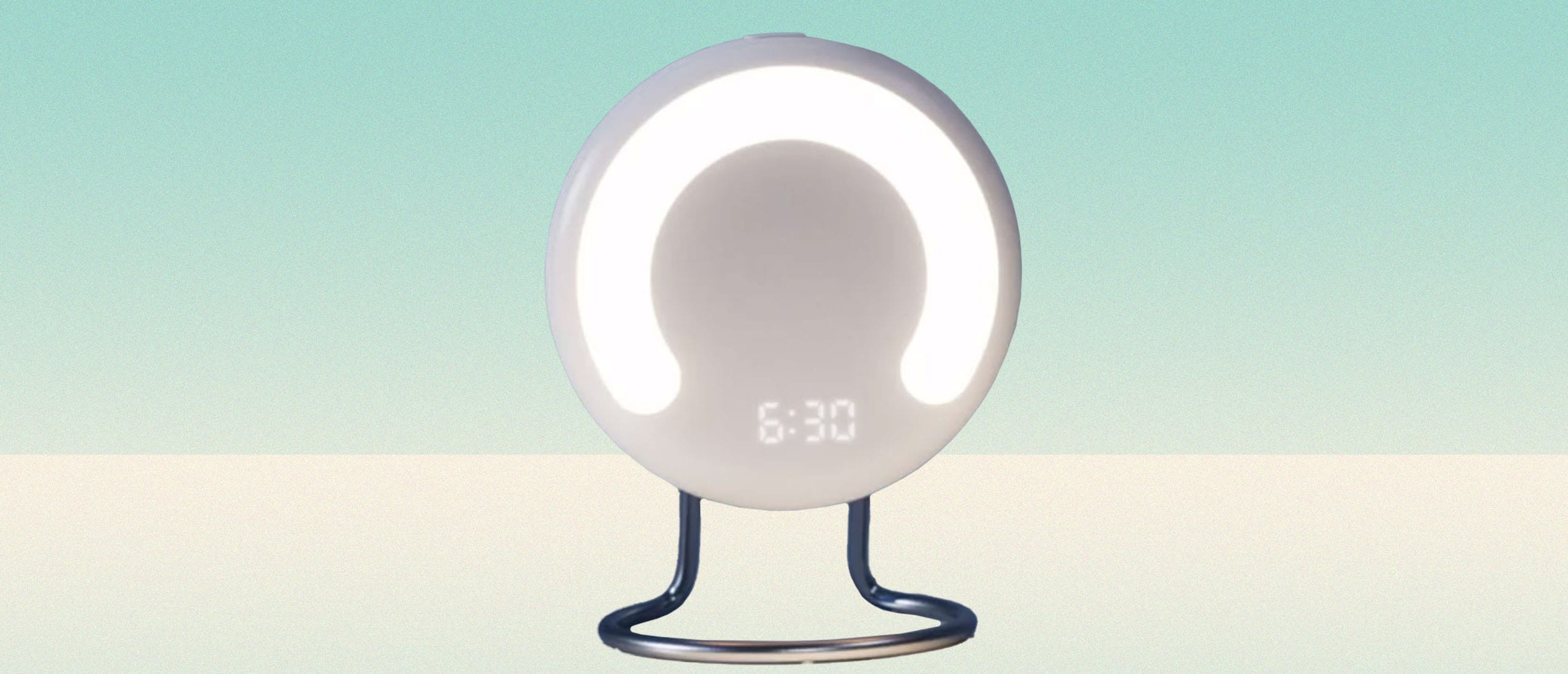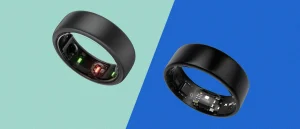Wake Up Grumpy? Amazon’s New Alarm Clock Can Help
Every passing day, week, month, and year health science makes the obvious somehow more obvious: quality sleep is one of the most important factors determining your day-to-day and long-term quality of life. Apart from biological anomalies, virtually no one lives a full life on consistently poor sleep, yet achieving a decent night’s sleep on a regular basis can feel like a grind at the best of times, and downright impossible when things aren’t going your way.
While there are no cure-all solutions, there are products that give you a better shot at better sleep. Amazon’s Halo Rise—a smart sleep tracker, alarm, and sunlight lamp rolled into one—is one such product. First available at the end of 2022, it’s the mega-company’s first roll of the dice at sleep. Is it any good? We sent units to members of the Hone Health Community (and one to the writer of this piece) to find out.
This story is a part of The Edge’s Community Review Project, where we send new and interesting gear to men in the Hone Health Community to review. If you’re interested in participating, join the community and email this story’s editor, Will Price with the subject line “Community Testing.”
What Is the Amazon Halo Rise?
The Halo Rise advertises three primary functions—wake-up light, sleep tracker, and smart alarm.
The clever combination of the three works without the use of any wearable watch or ring, too, which makes it somewhat unique in the realm of smart sleep devices. The Halo Rise starts by tracking you before you fall asleep with a built-in radar. The sensor can figure out when you’re going to sleep, when you fall asleep, and what level of sleep you’re in—and does so without the use of microphones or cameras.
The radar tracks your breathing pattern, which changes as you flow from awake to asleep, and the different levels of sleep. As you approach your preset alarm time, the device bides its time until your body is in the ideal “wake-up” state, when it starts to gradually illuminate the wake-up light (check the image below to get an idea of what that looks like).
Sleep data is kept on the app—where you can view sleep quality history—unless you wish to share it with another health-tracking app.

What’s Good About the Amazon Halo Rise?
More gradual wake-up cycle
No matter what “smart” product you’re thinking of buying, the first and most important question is this: will this make my life better? Every Halo Rise tester reported the product had dramatically improved how they wake up.
James E., a Hone Health Community member and product tester, said using it has led to him waking up in a better mood.
“[The Halo Rise] would wake me up when my body was most ready, closest to the time I said I wanted to wake up. Now this may sound bad as it can wake you up before your actual time, but it always woke me up when I was at the lightest part of my sleep cycle. This makes waking up and getting moving so much easier in the morning.”
Another tester, Chris L., said it’s helped him cope with an extremely early 3:30 a.m. alarm for work.
“The first morning the light woke me up at 3:12. Annoying but this felt like a natural wake-up. I wasn’t startled out of sleep like my usual alarm. For the next few nights with some fine tuning, I was able to wake up closer to my usual time with just the light. I like the gradual wake-up with the light. I feel like I’m easing into the morning instead of being startled awake.”
We know that loud alarms—sometimes repeated if you’re a serial “snooze” kind of person—jarring you out of sleep is unhealthy from Matthew Walker’s now-famous Why We Sleep, and our tester’s experiences seem to bear out this fact.
Dimmable display
The other universal pro reported by our testing team was the time display. Instead of the classic, bright red block letters of the alarm clocks of yesteryear, the Halo Rise is equipped with a time display that is somehow visible in complete darkness but spreads no light on its own.
“One minor thing I really liked was the ability to dim the display to nearly nothing, but still be able to read the time. I have to have almost complete darkness when sleeping, and this hits that sweet spot,” tester James E. reported.
The light level automatically dims and brightens with the time of day, but you can override this feature and make it brighter at night if you’re up burning the midnight oil.

Useful, simplified data
Our testers also appreciate the Halo app’s less is more approach. On the surface, the data provided is simple—time asleep, sleep scores, hours spent in various phases of sleep, etc.—but as you click deeper into the app you find page after page of data. The best part? You don’t need the treasure trove of sleep metrics to get what you paid for.
“The way the device tracks your sleep and gives you feedback based on how that sleep was is actually really cool. At first I thought it was a gimmick, but over time realized that the app was putting into data what I was feeling on any given day. Days where I had a low sleep score were days I noticed my energy just was not there. On days where it reported I had a decent sleep score I noticed easier moving in my day,” James E. wrote.
And to reiterate another unique selling point: it gathers this data without having the user wear a watch, ring, or bracelet. Not everyone is bothered by extraneous jewelry while trying to get to sleep, but for those who are this is a nice, if subtle, win.
What’s Not Good About the Amazon Halo Rise?
$140 isn’t cheap
I don’t have any facts to back this up, but I’m guessing very few people are getting in line to drop a buck-forty on an alarm clock—even one that does as much stuff as the Halo Rise.
On top of the up front cost, the app requires a $4 per month Halo membership after the initial six-month trial membership expires. Luckily, most of the app’s sleep-focused functions are unaffected by having or not having a membership, but it is an additional cost worth keeping in the back of your head.
While all of our testers liked the product and would recommend it to friends or family, fewer said they’d buy one for someone as a gift—suggesting the price tag feels a touch too high for what amounts to a fancy alarm clock.
Small adjustment period
While not the most fair critique, there is a bedding-in period with any new smart tech, but especially a smart alarm clock. Our testing team had two main quibbles: inconsistent wake-up times and the light itself.
By design, the Halo Rise supports inconsistent wake-up times. You input your alarm time and the device begins its wake-up cycle when it senses you’re in a lighter—and therefore easier wake—stage of sleep. This means you might roll out of bed 12 minutes before your 7 a.m. alarm, or right at 7. It will never allow your set alarm time to pass without beginning a wake-up cycle, though, and it does have a traditional onboard alarm noise just in case the light doesn’t always do the trick.
Our testers had to get used to a light waking them up. Because we humans are so used to waking up to blaring alarm clocks, the phenomena of the light-induced wake-up call can feel odd initially, but all reported no issues after a week of use.
Limited speaker
This may be asinine considering the Halo Rise is meant for improving sleep and not waking you up with loud noises, but it has speakers and it would be nice if you could use them like, well, speakers. You can enable them for sound alarms should the light not wake you up as intended, but you can’t use the speakers for music, podcasts, and so on. This is a small thing, but it’s odd that so much technology and functionality is built into a product that is certainly not cheap, then you can’t use some of the hardware freely.
The Competition
If you’re into the idea of light-assisted alarm clocks but aren’t interested in the minutiae of your time in bed, Hatch’s Restore alarm is a decent bet. Instead of sleep tracking, it boasts both a light-based wake-up call and pleasant audio cues to rustle you out of bed—think water lapping against a shore and birds chirping.
Philips SOMNEO Sleep & Wake-Up Light, $150
Philips SOMNEO system is basically a slightly fancier Hatch Restore. Its illumination quality is visibly better than the Restore or the Halo Rise, and it has the Restore’s audio functionality as well.
No, this ring does not zap you awake, but after reviewing it we’re confident it does track your sleep well. If you don’t have any trouble waking up but you want a low-key health tracker, an Oura Ring is worth considering.
Apple’s best deal when it comes to smartwatches is outfitted with a fairly impressive array of sleep tracking tech. It’s not going to wake you up with a soft, sun-imitating light, but it does sync perfectly with Apple Health and boasts loads of other health-tracking capabilities the Halo Rise doesn’t.
The Bottom Line
Amazon’s Halo Rise smart alarm clock does an excellent job waking you up in a manner that won’t ruin your morning. Its sleep data, while infinitely deep, is easy to understand and follow. We can understand how $140 for an alarm clock sounds steep, but we recommend it regardless.












